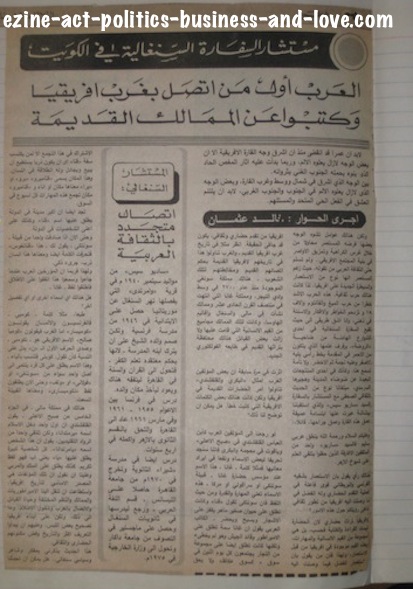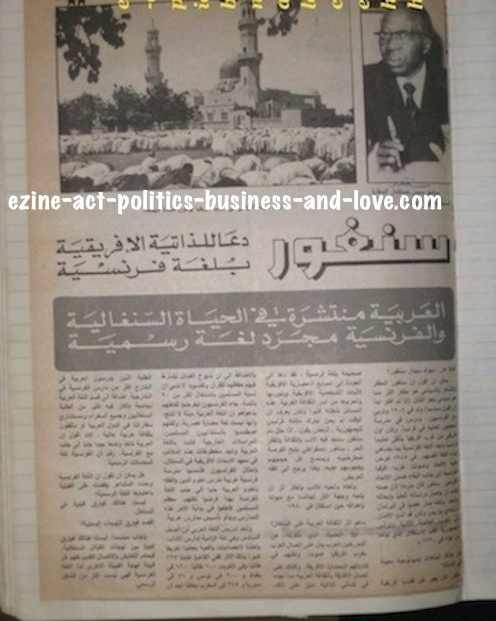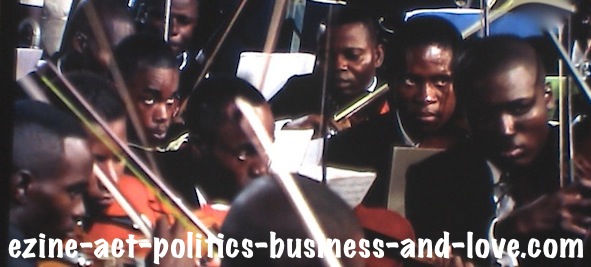Is the Ezine Acts African Literature Important to You, as Literate?
The African literature, whether it is on the Ezine Acts African Literature, or elsewhere should be important to you, if you were literate, or just somebody who's interested in the literature of Africa with the written part of it and the oral.
That is because the African literature has diversity through which it continues to be of great importance for the contemporary literary studies, as well as the interest of the global literary market, with the same interest the Latin literature has.
There are many evidences of this interest, whether they are in the distribution of the African and Latin literature, or in the scholarly made studies and researches about them.
Through more than 30 years of my journalistic experiences and while I was one of 4 editors in the cultural section of the Kuwaiti newspaper, Al-Watan in 1982, I found that many literate Africans did enjoy the Latin and the European literatures combined with their litterae humaniores more than they enjoy the African literature.
Continue the Ezine Acts African Literature and Culture below the image.
 Ezine Acts African Literature: Journalist, writer, poet and critic Khalid Osman's books collection including African literature, Kuwait, 1980.
Ezine Acts African Literature: Journalist, writer, poet and critic Khalid Osman's books collection including African literature, Kuwait, 1980.Journalist, writer, poet and critic Khalid Osman's books collection including African literature, Kuwait, 1980, at the time he started African cultural interviews and writing in the cultural section of Al-Watan newspaper. Get posters to make your site beautiful and earn additional income at the same time.
The Ezine Acts African Literature - Backgrounds!
Before I published the Ezine Acts African Literature page, and during that time in the newspaper, I wrote, "A litterateur with a global vision should start from within. I meant from his or her own literature and then get to the neighboring literature and go further to embrace and open his or her mind into the other global literatures.
This method is more educational and it was clear that time on the well-planned English educational system for non-English speakers and the French educational system in the Francophone zones in Africa and the Middle East.
Each of them, as you could see through the Ezine Acts African Literature, proved to be the best educational systems in the world at that time, whereby qualified educators were graduated even from elementary schools, not secondaries.
The English educational system, in particular, proved to be the best educational system found not elsewhere in the third world, but only in Sudan, although the education was (and still is) in Arabic in the primary schools.
The systematic educational example of it was very clear through the geography subject, where pupils had imaginary visits and tours that started at home to know the geographic and the human factors of living of the nationals in many areas of the biggest country in Africa. After that they had the same visits to some neighboring countries and after that to the rest of the world.
Through these lessons, as you could see from the Ezine Acts Literature, the pupils got to know the interior of their land, the surroundings and the external world. However, it is very strange that has not developed the regional parts of Sudan equally and created many marginal areas to cause many conflicts. Read about this at the HOA Political Scene.
Back to the Ezine Acts African Literature, from this point of view, the diversity of the African literature continues to be of great importance for the contemporary literary studies, as well as the interest of the global literary market, just like the Latin literature.
Continue the Ezine Acts African Literature and Culture below the image.
African Literature, Interview by Journalist, writer, poet and critic Khalid Osman in Al-Watan Newspaper, Kuwait, 1982. Posters could make your site beautiful and earn you additional income.
Insights on the The Ezine Acts African Literature!
The literature in Africa has been developed from the grassroots of some oral expressions since the first days the continent knew papers and prints during the colonization period. This indication applies to both poetry and story, as genres of literature, or literary genres. Both of them, however are genres of the nonfiction genre.
The tradition of the storytelling in the African narrative culture, as you could see through the Ezine Acts Literature has begun that time and developed to convert the oral tales into stories, novels, plays and even poetry (as we see in the nomad's couplets, as oral), all of which could possibly be started as lullabies.
But, after the research we conducted at the Ezine Acts African Literature, we see the first presence of that kind of the African literature has just appeared after many African people have been educated, great modern writers have emerged to use their folklore and customs and then the historical and political development to create great literary works.
We also see through the Ezine Acts African Literature that the cultures of the colonial authorities divided by the norms of the European cultures in the West had played some roles to influence some African writers and thus all of that has appeared as reflection of the modern cultures in the African literature.
At the same time some other African writers remained neutral and followed the Non-aligned movement and the rest has been influenced by the Eastern literatures of East Europe and the former USSR.
That means the international political theories, as you could see through the Ezine Acts Literature has played some roles to influence the African writers and the African literature. For example, there are examples of liberalism, socialism, communism and even non-aligned norms or notions in this literature.
Continue the Ezine Acts African Literature and Culture below the image.
Interview about the African Literature including the leading role of the poet, cultural theorist and politician Léopold Sédar Senghor by Journalist Khalid Osman in Al-Watan Newspaper, Kuwait, 1982.
The Arabic culture has also played a role in the historical events in Africa, an impact that remains in the multicultural atmosphere nowadays. It appears in the term "Afro-Arabic", referring to the mixture of the two cultures.
Many mixed nationals in the northern countries in the continent have Arabic cultural backgrounds. It is a norm that appears clearly in the African literature.
The Arabic language is the main language in most of them, although it is mixed with national phonetic and dialect. However, the movements of art sometimes integrate with the literary movements and sometimes divert.
Even in countries with heavy African presence, such as Djibouti, Eritrea, Mauritania, Somalia and Sudan, the Arabic culture with its language has been of great value.
Lately, the Islamic orientation has also impacted the African literature in the so-called Islamic countries in the continent, following the horrible rising of the Muslim Brothers in North Africa (Egypt), assisted by the anti-communism block in the international power.
After the collapse of the Eastern World, the so called Islamic movements has been assisted by the new world order to create the new world disorder.
Therefore, the so called Islamic dictatorial military regimes have created a climate of absenteeism in many deteriorating countries. Read about the political absenteeism at the HOA Political Scene and continue the Ezine Acts African Literature below the image.
African Literature, African Culture, African Music, African Arts.
During the continuous political transition, the African literature, as you could see through the Ezine Acts African Literature has been impacted by the social, economical and security factors.
The changes, transmigration and transaction in the African societies accompanied or impacted by the tribal wars and the unrest in many countries appear clearly strong in many literary works, such as (Buchi Ememcheta's, Chinua Acebe's and Nurruldin Farah's).
The development of the international schools or movements of arts has also played a role in the development of the African literature, we write about on the Ezine Acts African Literature and the African Art, we write about on the Ezine Acts African Art in general.
Following the global art essence, we write about at the Ezine Acts Art Essence many movements has appeared through many African literary works. However, the African art has some stand-alone (or unprecedented) examples of artworks, in addition to artworks that are impossible to find in any other continent in the world.
The interconnecting worlds of ritual and myth in the African literature stay different from other myths and rituals in Asia, Australia and Latin America, as you could see through the Ezine Acts Literature.
These myths and rituals in the African literature we cover on the Ezine Acts African Literature are even different from country to another in Africa. They are divided according to the tribal diversity in the continent.
However, there are many tribes and clans that may share the same rituals and myths. For example, you can find similarity between the myths in Nigeria at the Western Africa in other countries across the central African belt (the Francophone line during the colonization period) to the Eastern Africa (i.e. the art and literature of the Hawssa).
This diversity appears clearly in the African literature in Western Africa and the African literature in Eastern Africa. They could be also identified by the composition of the Briton, French and Italian cultures in these formerly colonized zones.
Nevertheless, when looking to their African literature, African writers perceive themselves as literates with unique cultural entity and therefore they have unique and original treasury of arts and unique literary characters.
Beside their presence in the literature in Africa, the inherited myths and rituals have also additional connection in fine arts. The art essence they reflect on the African paintings and sculptures reveals the connection of superstitions with the common life in many African societies.
So, the African literature integrates with the African arts whether they are drawn, cut or performed to make this mixture of creativity that keeps shaping the African inspirational atmosphere with that nostalgic lust of literary presence in the international literature.
However, the arts movements sometimes integrate with the literary movements and sometimes don't. The literature in Africa including stories, poetries and theatrical plays follow the international literary movements or literary schools.
The literary schools or movements known are the romantic movement, the social-realistic movement, the realistic movement, the naturalistic movement, the modernistic movement, the performance poetry and even the surrealistic poetry...
I think, I have innovated the last movement (surrealistic movement along with the imagery poetry) in my poetry book, "Rising of the Phoenix" or "Wakening of the Phoenix". See the right column, the Arabic Phoenix Poetry, Arabic Poems and the Phoenix Order.
The French art movements has always been there, although many african arts have their own styles of drawing, painting, filling, designing, imaging, shaping, cutting and posterizing.
See Claude Monet, Edouard Manet, Henri Matisse, Jean Bernard Carillet, Jean Honore Fragonard, Paul Cezanne, Paul Gauguin, Pierre Auguste Renoir and Raoul Dufy.
There are some other literary and arts movements that the African literature has not yet been in deep connection with them, such as Le Parnasse of Rimbaud and Verlaine (Parnas - Parnassian), Harlem Renaissance, Confessional Poetry, Magical Realism, Postmodernism, Imagism, Symbolism, and even Eroticism.
However, the last movement is not more than work of art in some African literary works, such as in the Sudanese novelist, Al-Tayeb Salih's "Season of Immigration to the North" and Buchi Emecheta's world and Chinua Achebe's World.
Despite this, the the Parnassians' influence has been intact in some artworks of some Sudanese literates and artists.
Continue your literary reading on the Ezine Acts Afriacn Literature through the Ezine Acts Art Links (sits Map 11 A) with its extension into sub-site-maps at Ezine Acts Art and Culture (site map 11 B), Ezine Acts Fine Arts (site map 11 C) French Paintings. (site map 11 D), Ezine Acts Literature (site map 11 E) and Ezine Acts Photo Gallery (site map 11 F).
Useful Resources at the Ezine Acts African Literature!
Here are some useful resources on this section of the Ezine Acts African Literature you can enjoy reading to explore the African literature.
The African Literature: An Anthology of Criticism and Theory has something to say about this.See more at the African literature store here.
Gods and Soldiers: The Penguin Anthology of Contemporary African Writing.
A Grain of Wheat (Penguin Modern Classics)
This is a compelling account of the turbulence that inflamed Kenya in the 1950s and its impact on people's lives. The line of the story on the Ezine Acts African Literature flows like this:
Five friends and age mates make different choices when the Mau Mau rebellion erupts in colonial Kenya.
Kihika joins the freedom fighters in the forest. Gikonyo supports the rebels, but is arrested and detained. Mumbi, Gikonyo's wife, works to keep family and home together in the village.
Karanja chooses to support the more powerful British masters. Mugo ultimately betrays his friends and loses his life in a desperate attempt to stay alive and stay neutral.
In this ambitious and densely worked novel, we begin to see early signs of Ngugi's increasing bitterness about the ways in which the politicians, not the fighters or their families, are the true benefactors of the rewards on independence.
Supportive Links in the Ezine Acts African Literature:
In addition to the Ezine Acts African Literature you may also be interested in the following art and literary pages in this category:
Dancing, Music and Songs:
Aerobics Classes| Ezine Acts Dance| Ezine Acts Music| Native Americans Videos| Red Indians Videos| Salsa Samba Dances| Sudanese Customs| Sudanese Music| Sudanese Song| Video Talk|
Paintings, Sculpture and Other Arts:
Adventures of Tin Tin| Basket| Ezine Acts Art Stores| Ezine Acts Caricatures| Ezine Acts Cartoons| Ezine Acts Exhibiting Online| Ezine Acts Freelance Photography| Ezine Acts Galleries| Ezine Acts Paintings| Ezine Acts Photography| Ezine Acts Pictures| Ezine Acts Sell Paintings Online| Gourmet Gift Baskets| Malerier| Pictures for Your Website| Sudanese Art| 10 Hints to Exhibit Your Artwork Online|
Producing Audio and Videos:
Audio Products| Digital and Video Products| Ezine Acts Video| Ezine Acts Video Converter| Ezine Acts Video Games| Ezine Acts Video Shows| File Converter Software| How to Produce Cable TV Spots?| Inventory Videotaping Business| NTI Home Video| Special Event Videos| Video Talk| Videotape Rental Store| Videotaping Ideas| Videotaping Service| Videotaping Weddings| Weddings Photography| Windows Movie Maker|
Publishing, Writing and Other Articles:
Article Writing| Ebook Publishing Articles| Editing and Publishing| Ezine Acts Bookshop| Ezine Acts Language Translation| Ezine Acts Multicultural Project| Ezine Acts Publishing| Headlines| Resume| Self-publish Book|
How To Be Active and Positive?
If you liked the Ezine Acts African literature, please share it, tweet it to Twitter and pin the pictures using the small buttons you see on the page.
However, if you have a passion like this, you can build it a small business you work at home in your spare time until you retire for good, using the image below.


Blogging for Pleasure| Business Strategies Cat.| Collective Consulting Services| Comments| Email Marketing Media| Ezine Act| Ezine Act Articles Index| Ezine Act Blog| Ezine Act, Politics, Business and Love| Ezine Acts Articles| Ezine Acts Articles Section| Ezine Acts Associate Programs| Ezine Acts Biz Marketing| Ezine Acts Business| Ezine Acts Business Financing| Ezine Acts Business Forums| Ezine Acts Business Publicity| Ezine Acts Comment C2 Entries| Ezine Acts Comments| Ezine Acts Discussion Board| Ezine Acts Forums| Ezine Acts Game Site| Ezine Acts Home Business| Ezine Acts Humanitarian Network| Ezine Acts Inspirational Articles| Ezine Acts Inspirational Sites| Ezine Acts Internet Marketing| Ezine Acts Love Commentaries| Ezine Acts Love Entries| Ezine Acts Love Stories| Ezine Acts Traffic Converter| Ezine Acts Web Security| Ezine Acts Website Maps| Ezine Articles|
© All rights reserved. HOME-BIZ-TRENDS.COM is one of Khalid Mohammed Osman's Networks.


